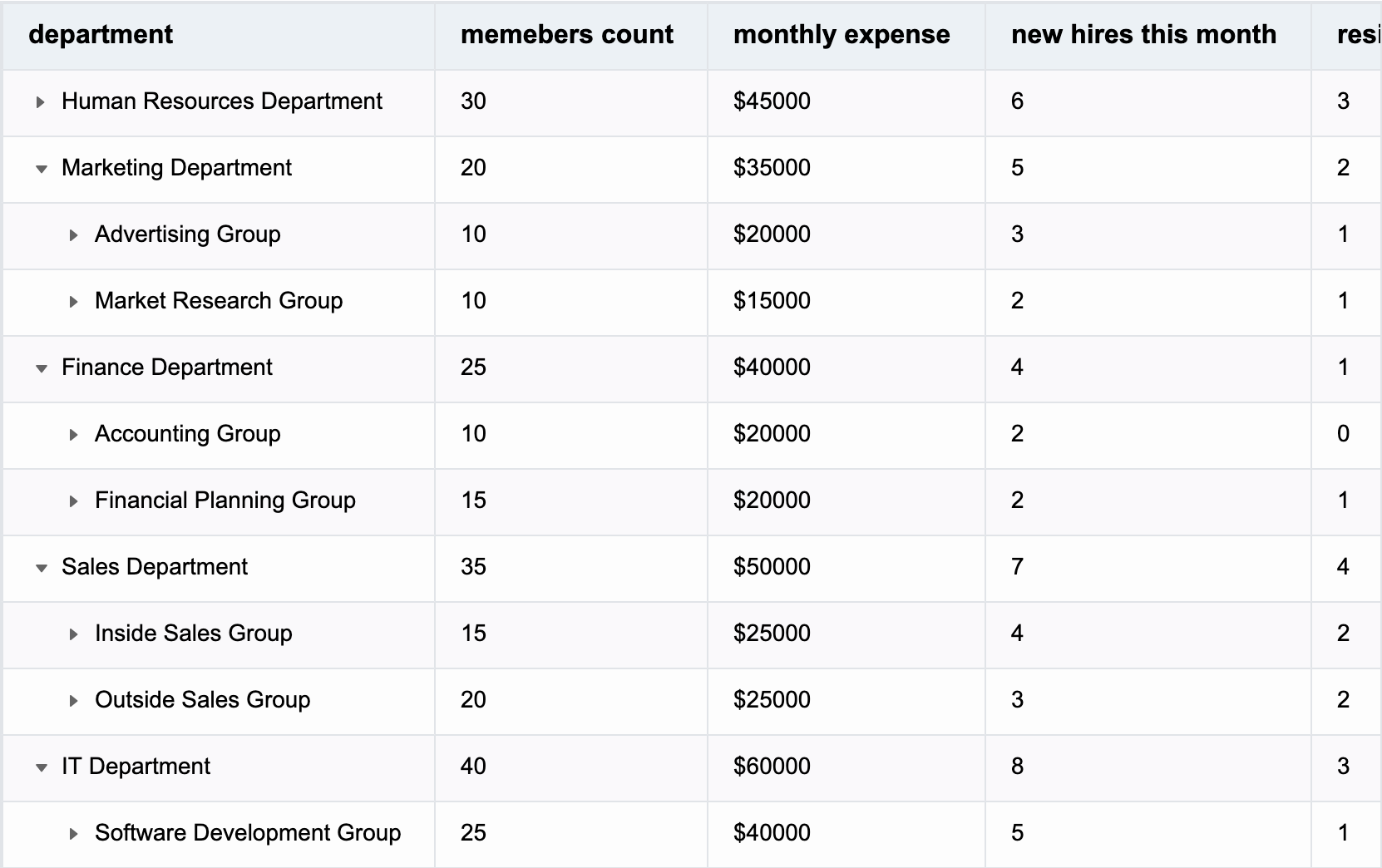Question title
How to set the expanded and collapsed state of the tree structure in a tree-structured table.
Problem Description
Through configuration, set the expanded and collapsed state of the tree structure table and customize the display style of the tree structure.
Solution
-
hierarchyExpandLevelcan be configured in theoptionof table initialization. This configuration item is defined as follows: When displayed as a tree structure, the number of levels is expanded by default. The default setting is 1 to display only the root node, and the configuration ofInfinitywill expand all nodes.
- You can also obtain the expanded and collapsed status of a certain cell through the API after the table is initialized, and set the expanded and collapsed status of a certain cell through the API.
// Get the tree-shaped expanded or collapsed state of a certain cell
getHierarchyState(col: number, row: number) : HierarchyState | null;
enum HierarchyState {
expand = 'expand',
collapse = 'collapse',
none = 'none'
}
// Header switch level status
toggleHierarchyState(col: number, row: number): viod;</br>
Code example
const option = {
records:data,
columns,
widthMode:'standard',
hierarchyExpandLevel: 2,
};
const tableInstance = new VTable.ListTable(container, option);
const state = tableInstance.getHierarchyState(0,1);
if (state === 'expand') {
tableInstance.toggleHierarchyState(0,1);
}</br>
Results display

Complete sample code (you can paste it into the editor to try it out):
let tableInstance;
fetch('https://lf9-dp-fe-cms-tos.byteorg.com/obj/bit-cloud/VTable/company_struct.json')
.then((res) => res.json())
.then((data) => {
const columns =[
{
"field": "group",
"title": "department",
"width": "auto",
tree: true,
fieldFormat(rec){
return rec['department']??rec['group']??rec['name'];
}
},
{
"field": "total_children",
"title": "memebers count",
"width": "auto",
fieldFormat(rec){
if(rec?.['position']){
return `position: ${rec['position']}`
}else
return rec?.['total_children'];
}
},
{
"field": "monthly_expense",
"title": "monthly expense",
"width": "auto",
fieldFormat(rec){
if(rec?.['salary']){
return `salary: ${rec['salary']}`
}else
return rec?.['monthly_expense'];
}
},
{
"field": "new_hires_this_month",
"title": "new hires this month",
"width": "auto"
},
{
"field": "resignations_this_month",
"title": "resignations this month",
"width": "auto"
},
{
"field": "complaints_and_suggestions",
"title": "recived complaints counts",
"width": "auto"
},
];
const option = {
records:data,
columns,
widthMode:'standard',
hierarchyExpandLevel: 2,
};
tableInstance = new VTable.ListTable(document.getElementById(CONTAINER_ID),option);
window['tableInstance'] = tableInstance;
const state = tableInstance.getHierarchyState(0,1);
if (state === 'expand') {
tableInstance.toggleHierarchyState(0,1);
}
})</br>
Related documents
Tree mode demo:https://www.visactor.io/vtable/demo/table-type/list-table-tree
Related api:https://www.visactor.io/vtable/option/ListTable#hierarchyExpandLevel
github:https://github.com/VisActor/VTable
